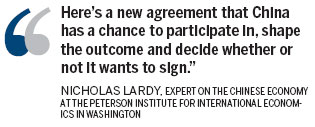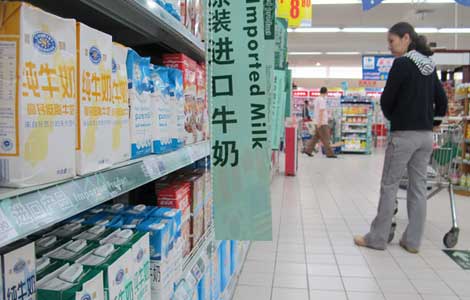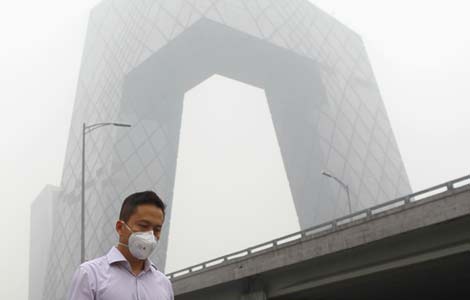China warms to US-led trade pact
Updated: 2013-07-03 11:26
By Ding Qingfen in Beijing and Joseph Boris in Washington (China Daily)
|
||||||||

Beijing may join TPP, although this will take time, sources say
China is becoming "positive" about the possibility of seeking entry to the Trans-Pacific Partnership, but it will be some time before any decision is reached, according to sources in the Ministry of Commerce.
"China is still doing its research" on the regional trade agreement, one source close to the matter told China Daily on condition of anonymity. The government has reached a consensus about the importance of the TPP and China's possible role in it, whereas previously, many officials were opposed, this person said.
Talks to form what's now called the TPP began in 2005 among Singapore, New Zealand, Chile and Brunei, but they accelerated with the entry of the United States in 2010. The other countries are Australia, Canada, Malaysia, Mexico, Peru, Vietnam and, most recently, Japan.
Officials in President Barack Obama's administration have said they intend to conclude the talks by year's end, but many trade experts call that timetable highly optimistic and predict negotiations will stretch into 2014 or beyond. Singapore's trade and industry minister, Lim Hng Kiang, said last week that an October deadline for the TPP talks' conclusion is unlikely to be met.
The 18th round - and first with Japan on board - of negotiations is set for July 15-24 in Kota Kinabalu, Malaysia. Participation of the world's third-biggest economy adds several layers to already-complex negotiations toward a pact that would represent 40 percent of global economic output and a third of all trade.
If No 2 economy China were to request membership, and existing TPP countries accepted, the talks would grow all the more complicated.
"Here's a new agreement that China has a chance to participate in, shape the outcome and decide whether or not it wants to sign. If it becomes a take-it-or-leave-it thing later, two or three years down the road, I think that makes it much more difficult for China to come in," said Nicholas Lardy, an expert on the Chinese economy at the Peterson Institute for International Economics in Washington.
Experts said the US regards the TPP as an economic twin to its strategic rebalance in Asia, and as a response to China's growing power in the region and the world.
Until recently, China had either criticized the TPP as a US-led effort to contain it economically or minimized the pact's importance. Recent pronouncements suggest Beijing's skepticism is waning, but there was ambiguity when President Xi Jinping, at his California summit with Obama last month, asked the US leader to keep him updated on the talks' progress.
Tian Deyou, deputy director-general for American and Oceanian affairs in the Ministry of Commerce, said the government has recognized the need for a re-evaluation of the TPP.
US officials, emphasizing that TPP participation must be sought, have said China is welcome to request an invitation but that it would be expected to adhere to the pact's high standards, including in labor and environmental protection.
Daniel Russel, assistant secretary of state for East Asian and Pacific affairs, told a Senate subcommittee at his June 20 confirmation hearing that the US "would like TPP to be the highest-quality, most inclusive and transparent trade arrangement ever". Russel didn't directly address China's possible accession but said "the door is not closed eventually to additional countries joining". He stressed, however, that the talks now underway are Washington's top priority.
In late May, Ministry of Commerce spokesman Shen Danyang said Beijing would analyze the prospect of seeking a TPP invitation, based on research and principles of equality and mutual benefit. Hong Lei, a Ministry of Foreign Affairs spokesman, said China is open to all trade pacts, including the TPP, that would enhance Asia's integration and prosperity.
But there is a long way to go before China could join, as the pact would involve core interests of many sectors including finance, foreign exchange and State-owned enterprises, said Tian, of the ministry's American and Oceanian affairs department.
Arvind Subramanian, who researches trade issues at the Center for Global Development and the Peterson Institute, said: "It's not clear to me that the US wants China in the TPP, at least during the negotiating phase, if the whole premise of this is asymmetric globalization. If China is in on the negotiations, they could sink because China's too big."
With the Doha round of talks under the World Trade Organization, launched in 2001, now stalled, countries worldwide are pursuing access to new markets through bilateral and regional trade pacts.
Besides the TPP, the US is set to begin talks next week on the Trans-Atlantic Trade and Investment Partnership with the 28-nation European Union. The two already have the world's most lucrative bilateral trade and investment relationship, worth some $5 trillion.
Against this backdrop, "China has to reconsider its strategy, turning more positive about the TPP. Otherwise, it will get sidelined on the global trade rules," the anonymous source said.
Xue Rongjiu, a vice-chairman of the China Society for WTO Studies, said: "High levels of the Chinese government should show their resolution on joining the TPP, pressurizing ministries and local governments to make it happen. We have to break the barriers and break the vested interests."
The Peterson Institute's Landy said China's new leaders are "very serious" about reforms and that Xi may see TPP entry as part of a strategy to use trade-pact requirements as the impetus for change, similar to economic liberalization pushed through in the 1990s by Premier Zhu Rongji as China was working toward WTO accession.
"In a practical sense, it would be very difficult to incorporate China into the [TPP] negotiations at this stage," said Matthew Goodman, who was White House coordinator for the Asia-Pacific Economic Cooperation and the East Asia Summit forums during Obama's first term. "I don't think China, even if it expresses interest and seriously considers it, is going to be ready, willing and able to join."
The unnamed Ministry of Commerce source said: "We know it's difficult, but the key point is we have to change minds and stick to opening-up to the world. Once we are determined on the TPP, everything else will be solved."
The source predicted that ongoing talks on an investment treaty between China and the US will pave the way for China to join the TPP. The treaty talks began in 1980 but were suspended until being relaunched in 2008.
"The treaty touches on many sensitive and important issues, based on which the TPP talks would be easier," the source said.
Yang Ziman in Beijing and Chen Weihua in Washington contributed to this story.
(China Daily USA 07/03/2013 page1)

 Canada vigilant after terror plot
Canada vigilant after terror plot
 Beckhams' star power shines
Beckhams' star power shines
 Worried parents drive imported milk sales
Worried parents drive imported milk sales
 Rumbia subsides but still brings heavy rain
Rumbia subsides but still brings heavy rain
 Fire engulfed Arizona firefighters in seconds
Fire engulfed Arizona firefighters in seconds
 Yao Ming, McGrady team up for charity
Yao Ming, McGrady team up for charity
 Egypt's Mursi rebuffs army ultimatum
Egypt's Mursi rebuffs army ultimatum
 No quick end in sight for Beijing smog
No quick end in sight for Beijing smog
Most Viewed
Editor's Picks

|

|

|

|

|

|
Today's Top News
Apple in court over alleged IPR infringement
Expats develop taste for organic dairy
'Positive' sign on Asia-Pacific free trade pact
US delays major requirement of health law
Venezuela eyed as Snowden's asylum
FM responds to Manila's accusations
Prosecution wraps up Wikileaks case
Credit crunch hits smaller firms
US Weekly

|

|






